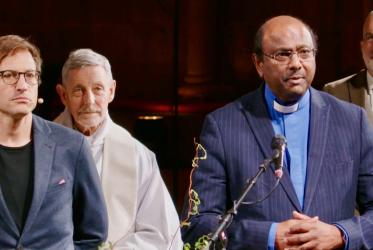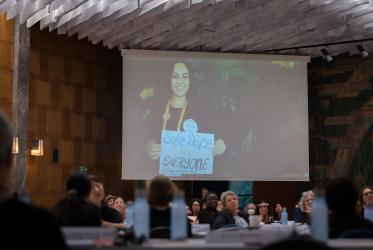In a visit to Bern on 4-5 November, World Council of Churches (WCC) general secretary Rev. Dr Olav Fykse Tveit visited with leaders of the Federation of Swiss Protestant Churches, focusing on the role of the WCC in the future shaping of the ecumenical movement.
Tveit spoke during the general assembly of the Federation of Swiss Protestant Churches, exploring the question “Where does the ecumenical movement stand today and where should the WCC take in it in the future?”
The ecumenical movement doesn’t necessarily stand today - but moves, noted Tveit. “I see more and more churches and people taking up the invitation of the 2013 10th Assembly of the WCC in Busan to participate in a Pilgrimage of Justice and Peace and to engage in transformative action,” he said. “I believe that the movement, essentially a vibrant renewal movement of the churches for the sake of the kingdom, has never been more relevant.”
Ecumenism is really the dynamic, counter-inertial, renewing force of Christian love, Tveit continued. “It compels us as disciples of Jesus always and everywhere to open ourselves empathically and to place ourselves at the service of others,” Tveit said. “Conversely, in the critical side, we may think of ecumenical Christianity as an authentic alternative and counter-witness to consumerist Christianity, to merely therapeutic Christianity, the prosperity gospel, xenophobic or racist Christianity, and nationalist forms of Christianity.”
In other words, Tveit said, ecumenism is the perennial self-critical, renewing impulse in Christian commitment. “It will demand yet also enable us to transcend the narrow boundaries and parochialisms of our self-interest, of race or class or even of confession or creed,” he said. "I believe that wherever Christ’s pilgrim people and communities of faith are willing to test those boundaries and divisions of our world in the name of the authentic gospel, ecumenism lives, indeed thrives.”
Ecumenism also leads us to choose creative collaboration over stubborn insistence on tradition, Tveit concluded. “So ecumenism has much to offer an imperiled world today: a deeply grounded, energetic love that is also critically conscious and fully accountable and models a creative collaboration that the world so desperately needs.”
In a sermon, Tveit reflected on what connects the world with God, and how much we need reconciliation in the world. “The world needs an end to the rule of sin,” he said. “We need reconciliation with God, with each other, with creation, with ourselves.”




